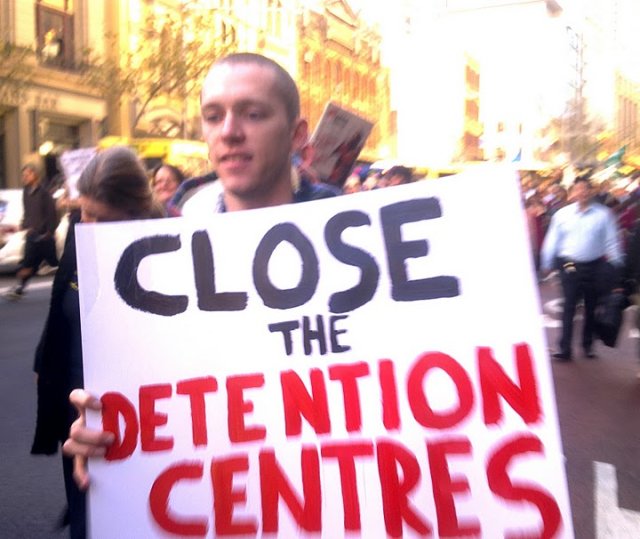
The federal Labor government has ignored the rising humanitarian crisis in Australian detention centres, even after Fijian-born Josefa Rauluni jumped to his death inside Villawood on September 20.
Three days before the tragic event, newly appointed immigration minister Chris Bowen announced that $50 million would be spent on 1600 new detention spots for asylum seekers.
Six hundred beds would be added to Curtin detention centre in remote WA, and 100 places would be added for families and children inside Melbourne’s “Immigration Transit Accommodation”.
In two to three weeks, the remote Scherger airforce base near Weipa in Cape York would be converted into a 300-bed detention centre, the department said.
Bowen said on September 17: “Our system of detention centres is under pressure from increased arrivals by boat, increased rejection levels of asylum claims, which means people stay in detention while their appeal is heard or while they're being repatriated to their country of origin.”
He declined to visit Villawood following Rauluni’s death and the roof-top protests, which he said wouldn’t be “particularly helpful”. Instead, private-prison operator Serco — which runs all of Australia’s detention centres — was left to “negotiate”.
“Obviously, I need to make it very clear that the decision about who stays in Australia or doesn't stay in Australia isn't determined by a protest”, he told MTR Today on September 21.
Australia's system of mandatory detention has been criticised by countless human rights and advocacy groups. Graham Thom from Amnesty International called overcrowding an “inevitable and unacceptable” result of mandatory detention, said the September 18 Sydney Morning Herald.
Pamela Curr, campaign coordinator at the Asylum Seeker Resource Centre wrote on ABC Online’s The Drum on September 20 that indefinite mandatory detention was cruel and undignified.
“We know that people who have been tortured and suffered extreme trauma, such as watching family members killed or mothers and sisters raped, suffer most of all in detention.
“The enforced idleness leaves them with too much time to fight back memories and fend off those thoughts too terrible to deal with.
“Right now our detention centres are filled with people who have experienced or witnessed torture and trauma. Teenagers without parents who have nothing to do all day but worry about their widowed mothers and vulnerable brothers and sisters in camps.”
As at August 13, the immigration department said 4619 people were housed in some form of immigration detention. This included “2211 in immigration detention on the mainland and 2408 in immigration detention on Christmas Island”. Ninety-five percent were refugees who had arrived by boat.
In 2009, the government used increasingly ad hoc methods to cram more and more refugees into Christmas Island’s detention centre, adding hundreds of new bunks, erecting tents inside the compound and transporting shipping containers to the island to house refugees.
Fraught conditions on Christmas Island led to the federal government recommissioning the facilities in Sydney, Melbourne, Darwin, Brisbane, Perth, Port Augusta and Leonora.
Some asylum seekers who have been transferred were initially rejected for refugee status. Many anxiously await appeals. As the government’s rejection rate rises — August immigration numbers said 115 applications had been refused or were pending appeal — so does the stress and instability of those left waiting.
But rather than take the obvious, simple and humane step of letting people live in the community while they wait to hear their fate, the government is expanding detention.
Moreover, the millions of dollars spent on detention could and should be spent on accommodating refugees in the community and support services for them.
While pursuing this onshore cruelty, the Australian government also continues to cast around for a similarly inhumane “offshore solution”.
The September 23 Australian said Prime Minister Julia Gillard had “renewed discussions about Australia's offshore processing plans with East Timor's Prime Minister Xanana Gusmao”. Bowen was due to visit East Timor to “continue negotiations”.
An immigration department spokesperson told the Australian on September 20 that “the government was working with all its regional neighbours to establish a third-country processing option”.
But, he said: “Our focus remains on East Timor and those discussions are ongoing.”
Boats carrying small numbers continue to arrive from the north. Forty-nine asylum seekers were on a boat found north-west of Christmas Island on September 20, making it the 96th vessel intercepted this year.